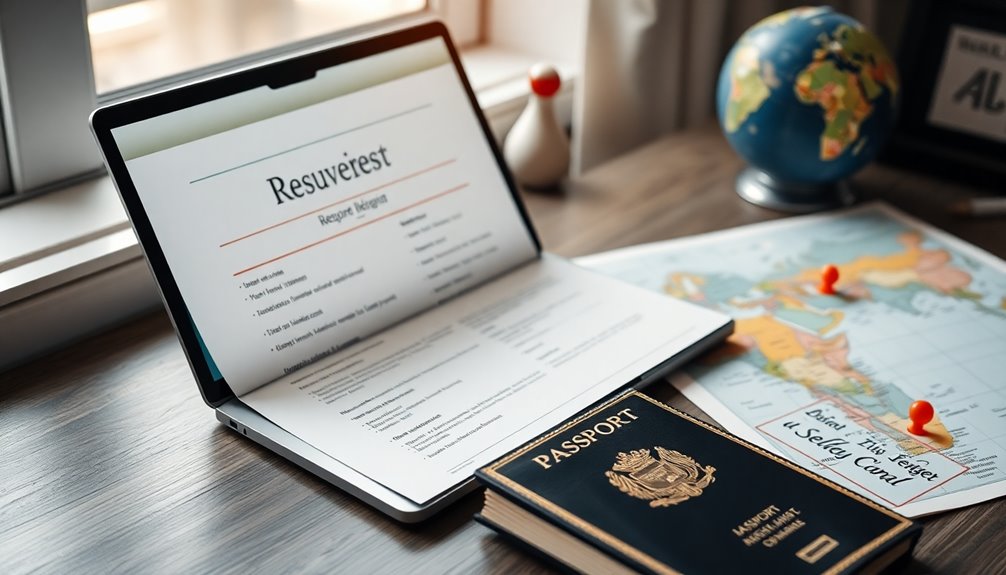To find work abroad, start by setting clear career goals and researching target countries’ job markets, cultures, and legal requirements. Tailor your resume and cover letter to fit local expectations and highlight language skills. Use international job portals, network online, and build a professional presence. Prepare for cultural differences and interview etiquette to make a good impression. If you keep exploring, you’ll discover key tips to succeed in your global job search.
Key Takeaways
- Define clear career goals and research target countries’ economic and cultural environments for better market understanding.
- Tailor your resume and cover letter to highlight international experience, language skills, and cultural awareness.
- Utilize global job portals, networks, and industry-specific forums to discover international opportunities.
- Prepare for cultural differences in communication and interview etiquette to build rapport abroad.
- Ensure legal and logistical readiness by understanding visa requirements, work permits, and relocation procedures.
Assessing Your International Career Goals

Before you begin your international job search, it is vital to clearly define your career goals. This clarity helps you focus your efforts on opportunities that align with your aspirations. Consider how international work will contribute to your personal development, such as gaining new skills or broadening your perspective. Evaluate your language proficiency, as strong language skills increase your marketability and ease your integration into new environments. Ask yourself what you hope to achieve professionally and personally by working abroad. Setting specific, realistic goals ensures you stay motivated and targeted in your search. Remember, understanding what you want from an international career will guide your decisions and help you identify the right countries and roles to pursue. Additionally, understanding the role of technology in global job markets can help you leverage digital tools and platforms to enhance your international job search. Cultivating self-awareness about your strengths and weaknesses can further refine your approach and improve your chances of success. Recognizing the importance of sound design in media production can also inspire you to develop relevant skills or explore international opportunities in creative industries. Developing cultural competence is equally crucial, as it enables smoother adaptation and collaboration in diverse work environments.
Researching Countries and Markets

When researching countries and markets, you need to analyze their economic environment to understand job stability and growth prospects. You should also consider cultural and language differences that could impact your work and communication. Additionally, check the legal work requirements to confirm you meet all visa and employment regulations before making any moves.
Economic Environment Analysis
Have you ever wondered how a country’s economic health can influence your job prospects abroad? When researching markets, pay close attention to currency fluctuations, as they can impact your salary’s real value and overall financial stability. Countries with high economic stability tend to offer more consistent job opportunities and lower risks of sudden downturns. Understanding the economic environment helps you gauge whether a nation’s job market is resilient or volatile, guiding your decision to move or invest time into securing a position. Keep an eye on economic indicators like GDP growth, inflation rates, and fiscal policies, which directly influence employment opportunities. A stable economy not only enhances your job security but also ensures your earnings retain their worth over time. Monitoring economic indicators can provide crucial insights into a country’s financial health and employment trends, while awareness of biodiversity can also reflect a country’s commitment to sustainable development and environmental health.
Cultural and Language Factors
Understanding a country’s cultural norms and language landscape is essential for steering its job market successfully. By researching local customs, you gain insight into workplace etiquette, communication styles, and societal expectations, helping you build rapport and integrate smoothly. Recognizing potential language barriers allows you to prepare, whether by improving language skills or using translation tools, ensuring clear communication. Familiarity with cultural nuances also helps you avoid misunderstandings that could hinder your job prospects. Adapting your approach to align with local customs demonstrates respect and increases your credibility. Additionally, understanding local professional environments, such as workplace culture, can further enhance your adaptability. Staying informed about AI safety and emerging technological trends in the country can give you a competitive edge in the evolving job market. Ultimately, investing time in understanding these cultural and language factors boosts your confidence, enhances your networking efforts, and positions you for success in your international job search.
Legal Work Requirements
How do you guarantee your work authorization aligns with a country’s regulations? Start by thoroughly researching each country’s legal work requirements. You need to understand what legal documentation is necessary to obtain valid work authorization. Different nations have specific procedures, visa categories, and eligibility criteria. Make certain your documentation, such as work visas or permits, is current and accurate before applying. Missing or incorrect legal paperwork can delay or jeopardize your job prospects. Contact embassies or consulates for official information, and consider consulting legal experts familiar with the country’s immigration laws. Staying informed about changes in regulations helps you avoid pitfalls and makes sure you meet all legal requirements. Properly managing your legal documentation is essential for a smooth transition and compliance with local employment laws. Additionally, understanding the water-related regulations in your target country can prevent unforeseen legal issues, especially if your job involves water use or environmental considerations. Familiarity with local employment laws can further ensure compliance and smooth employment processes. Monitoring updates in immigration policies can also help you adapt quickly to any procedural changes. Being aware of work permit requirements specific to your industry can improve your application success rate and streamline your entry process.
Understanding Visa and Work Permit Requirements

Planning your international job search involves orienting yourself with visa and work permit requirements, as each country has its own rules and procedures. You need to understand visa regulations to determine which type of visa suits your job and stay duration. Some countries require you to secure a work permit before arriving, while others allow you to apply after entry. When applying for work permits, make sure you gather all necessary documents, such as job offers, proof of qualifications, and financial stability evidence. Be aware that the process can vary greatly, with some nations offering fast-track options or sponsorship programs. Staying informed about visa regulations and carefully completing work permit applications will help you avoid delays and legal issues, making your international job hunt smoother. Additionally, understanding the application process and legal requirements can prevent complications related to employment authorization. Familiarizing yourself with visa and permit procedures can further streamline your preparations and increase your chances of success. Moreover, researching country-specific regulations can help you adapt your plans to meet local compliance standards and expedite your entry process. Being aware of the divorce process and requirements in the host country can also be beneficial if personal situations change during your stay. Understanding the renewal and extension procedures for work permits is also crucial to maintain your legal status throughout your employment period.
Crafting a Global Resume and Cover Letter

When applying for jobs across different countries, your resume and cover letter need to reflect a global perspective. Focus on cultural adaptation by tailoring your documents to align with local expectations and customs. Highlight your language proficiency clearly, especially if you’re fluent in the country’s primary language, as this exemplifies your ability to communicate effectively. Use an international format, emphasizing relevant skills and experiences that resonate globally. Avoid cultural biases or assumptions that could misrepresent your background. Keep your tone professional yet adaptable, showing awareness of local business norms. Incorporate keywords from the job description to improve your chances with applicant tracking systems. Remember, your goal is to present yourself as culturally aware and versatile, ready to thrive in a new environment. Additionally, understanding current news in Indonesia can give you insights into the economic and social climate, which may be valuable during interviews or networking. Staying informed about AI in Education and technological advancements can also help you demonstrate awareness of global trends that impact work environments worldwide. Being aware of espionage tactics can further underscore your understanding of international security concerns that might be relevant in certain industries or roles.
Leveraging International Job Portals and Networks

You can boost your international job search by exploring global job portals that list positions worldwide. Building relationships through networking strategies abroad and using social media platforms can also open doors to opportunities. These tools together help you connect with employers and industry peers across borders effectively. Additionally, understanding your own personality traits, such as communication style and interpersonal skills, can enhance your ability to navigate diverse cultural environments successfully. Personality assessment tools can provide valuable insights to tailor your approach in different international contexts, especially when considering cultural adaptability required for working abroad. Recognizing the importance of effective communication can further improve your interactions and foster stronger professional relationships across cultures. Developing cultural awareness can also help you better understand local customs and expectations, making your transition smoother, and being aware of mental health considerations can support your overall well-being during this process.
Global Job Portals
Global job portals serve as essential tools for expanding your international job search. They connect you to a wide range of opportunities, including remote work and positions that may require international relocation. Using these platforms, you can filter jobs by location, industry, or remote options, making your search more targeted. To maximize your chances, consider creating tailored profiles that highlight your skills and international experience. Be proactive by setting up alerts for new postings and regularly updating your resume. Many portals also offer resources like company reviews and salary insights. Remember, these platforms are your gateway to global opportunities—so explore multiple sites and stay persistent in your search for the perfect international role. Incorporating website optimization strategies such as optimizing your profile and listings can also enhance your visibility and engagement on these portals. Additionally, taking advantage of networking opportunities within these platforms can help you connect directly with recruiters and industry professionals worldwide.
Networking Strategies Abroad
Leveraging international job portals and networks can considerably boost your overseas job search efforts. When connecting with professionals abroad, it’s essential to understand cultural etiquette to build genuine relationships. Respect local customs and communication styles, as this shows your cultural sensitivity and professionalism. Language barriers can pose challenges, so consider using bilingual profiles or translation tools to communicate effectively. Join industry-specific groups or forums on global platforms to expand your network and gain insights into local job markets. Attending virtual events and webinars can also help you meet contacts in your target country. Remember, establishing trust takes time, so be patient and consistent in your outreach. By steering through cultural nuances and overcoming language barriers, you’ll strengthen your international network and enhance your chances of landing a job abroad.
Utilizing Social Media
Social media platforms have become powerful tools for connecting with international employers and expanding your job search. To make the most of digital networking, focus on strong social media branding that highlights your skills and experience. Engage actively on platforms like LinkedIn, Twitter, or industry-specific networks to showcase your expertise and build relationships. Here are some tips to maximize your efforts:
- Optimize your profile with a professional photo and clear headline
- Share relevant industry insights to demonstrate your knowledge
- Connect with professionals and recruiters in target countries
- Join groups or forums related to your desired location or field
Building a Professional Presence Online

Creating a strong professional presence online is essential for standing out in an international job market. You can shape your personal branding by showcasing your skills, achievements, and expertise clearly on platforms like LinkedIn. Consistently sharing relevant content and engaging with industry discussions boost your visibility and credibility. Online networking is equally important; connecting with professionals in your target country helps you build relationships and gain insights into local job opportunities. Keep your profiles professional, accurate, and tailored to your career goals. Use keywords relevant to your industry to improve your searchability. Regular activity and authentic interactions demonstrate your commitment and expertise, making you a more attractive candidate to international employers. Building this online presence opens doors and positions you as a serious contender in the global job market.
Preparing for Cultural and Language Differences

Understanding and adapting to cultural and language differences is essential when pursuing international job opportunities. To succeed, focus on cultural adaptation by researching local customs, business etiquette, and communication styles. Improving your language proficiency can boost confidence and help you connect better with colleagues. Consider these tips:
- Learn basic phrases and greetings in the local language
- Study cultural norms to avoid misunderstandings
- Practice active listening to better grasp subtle cues
- Engage with native speakers to enhance fluency and understanding
Navigating the Interview Process Abroad

Embarking on the interview process abroad can be challenging, but thorough preparation can considerably boost your confidence and chances of success. Language barriers might make communication tricky, so practice common interview questions in the local language or with a native speaker. Be aware of interview etiquette, which can vary notably across cultures; for example, some countries value formal greetings, while others prefer a more relaxed approach. Dress appropriately, as standards differ internationally, and arrive on time—punctuality is often seen as a sign of professionalism. During the interview, listen carefully, speak clearly, and don’t be afraid to ask for clarification if needed. Showing respect for local customs and demonstrating cultural awareness can leave a positive impression, increasing your chances of landing the job.
Securing and Transitioning Into Your New Role

Securing your new role is just the first step; a smooth shift into your position requires proactive planning and adaptability. To facilitate a seamless transition, focus on mastering relocation logistics and understanding onboarding procedures. Prepare by organizing travel arrangements, housing, and necessary documents early. Once on-site, actively engage in onboarding to grasp company culture and expectations. Consider these tips:
- Clarify relocation logistics early to avoid surprises
- Review onboarding procedures ahead of time
- Connect with colleagues for support and guidance
- Set short-term goals to build confidence in your new role
Frequently Asked Questions
How Do I Compare Salary Expectations Across Different Countries?
When comparing salary expectations across countries, you should consider the cost of living and salary benchmarks in each location. Research local salary data for your industry and role, then adjust for differences in expenses like housing, transportation, and taxes. This helps you understand real earning power, ensuring you don’t just compare gross figures but also evaluate how comfortably you can live and save in each country.
What Are Common Challenges Faced When Relocating Internationally?
Moving abroad feels like stepping into uncharted waters, and you’ll face challenges like cultural adaptation and language barriers. You might stumble over new customs or struggle to find your voice in a foreign tongue. These hurdles can feel overwhelming, but with patience and an open mind, you’ll learn to dance with the differences. Embrace the journey, knowing that each challenge is a stepping stone toward your global adventure.
How Can I Build a Professional Network Abroad From Scratch?
You can build a professional network abroad by joining local industry groups, attending events, and leveraging social media platforms like LinkedIn. Focus on cultural adaptation by learning about local customs and practicing language skills to overcome language barriers. Reach out to colleagues and alumni, and be proactive in maintaining contacts. This approach helps you establish trust and credibility, making it easier to grow your network from scratch.
What Legal Implications Should I Consider Before Accepting a Job Offer?
Before accepting a job offer abroad, you should consider legal implications like obtaining the appropriate work visa, which allows you to work legally in the country. Review the employment contract carefully for clauses related to work authorization, visa sponsorship, and your rights. Guarantee you understand any restrictions or obligations tied to your visa status, and consult legal experts if needed to avoid future legal issues.
How Do I Handle Time Zone Differences During Remote Interviews?
To handle time zone differences during remote interviews, you should prioritize effective time zone coordination. Use online tools like world clocks or scheduling apps to find overlapping hours that work for both you and your interviewer. When scheduling, suggest multiple options and confirm the time in their local zone. Clear communication guarantees you’re on time, shows professionalism, and helps avoid confusion, making your interview process smooth and efficient.
Conclusion
Starting on an international job hunt is like setting sail across uncharted waters—you’ll face challenges, but the horizon holds endless opportunities. Remember Sarah’s story: after months of research and perseverance, she landed her dream role abroad, transforming her life. With determination and preparation, you can navigate these waters confidently. Keep your eyes on the destination, stay adaptable, and trust that each step brings you closer to a new adventure—your journey is just beginning.









